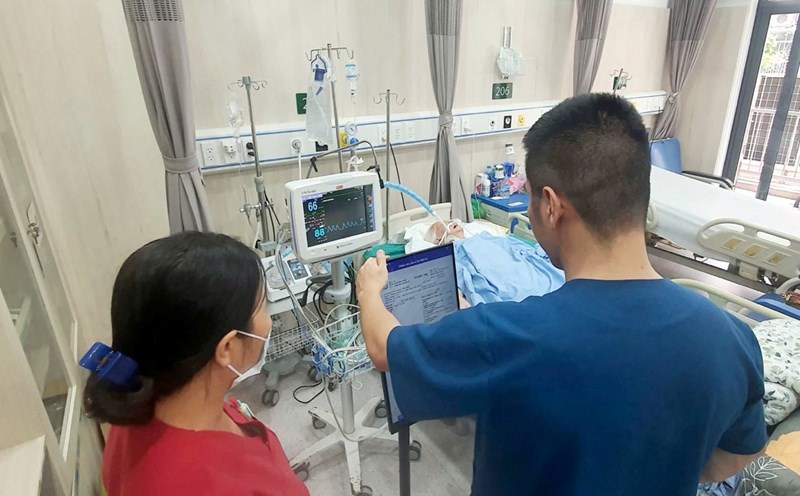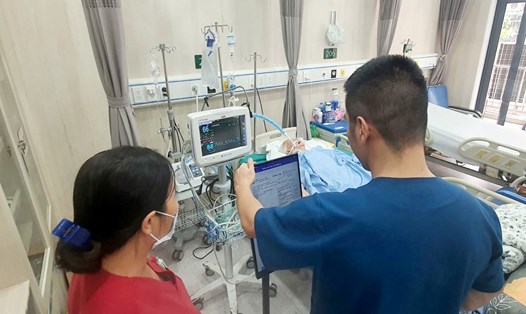9 hospitals deploy electronic medical records
On April 10, the Ho Chi Minh City Department of Health held a conference to promote digital transformation activities of the city's health sector.
Associate Professor, Dr. Nguyen Anh Dung - Deputy Director of the Ho Chi Minh City Department of Health said: According to statistics, up to now, Ho Chi Minh City has 9 hospitals that have been assessed and met the standards of electronic medical records (Group 1) including: Nguyen Tri Phuong Hospital, City Children's Hospital, Hung Vuong, Le Van Thinh, Gia Dinh People's Hospital and Ho Chi Minh City Dentistry.
In addition, there are 7 hospitals that are eligible for implementation but have not yet completed the appraisal documents (Group 2) and 35 hospitals that have not yet made electronic medical records (Group 3) because they have not met the conditions.
In 2025, for hospitals in group 3, the Ho Chi Minh City Department of Health requires urgency, high concentration, and a plan to ensure the minimum conditions for implementing electronic medical records.
Associate Professor, Dr. Nguyen Anh Dung emphasized that by the end of September 2025, all public hospitals under the Ho Chi Minh City Department of Health must complete electronic medical records.
In 2025, the Ho Chi Minh City Department of Health aims for 100% of hospitals to deploy electronic medical records and data connection between hospitals in the city. By 2030, 95% of people will have electronic health records.
Also at the conference, Children's Hospital of the City shared a comprehensive electronic medical record model - a synchronous digital platform in patient management and care, from the stage of registering for unregistered medical examination, electronic prescriptions, to managing patient data in conjunction with insurance and lower-level medical facilities.
According to Associate Professor, Dr. Truong Quang Dinh - Director of the City Children's Hospital, this system not only optimizes professional processes but also strongly supports hospital governance, helping to make accurate decisions, reduce the burden on medical staff, and improve the quality of service to the people.
The hospital has invested in equipment, information technology systems, and deployed HIS 2.0 software (hospital information system) to move towards paperless hospitals.
Efforts to build health sector data
Associate Professor, Dr. Tang Chi Thuong - Director of the Ho Chi Minh City Department of Health said that the city has 51 public hospitals, however, only 9 hospitals have implemented electronic medical records and 7 hospitals are about to implement. 3/4 hospitals are not yet qualified to do so, the deadline is September 2025.
The delay in digital transformation, especially electronic medical records, will seriously affect the efficiency, effectiveness and efficiency of the entire industry. If after this time, any hospital does not have an electronic medical record, the hospital leadership must conduct a review.
Currently, the Ho Chi Minh City health sector is making efforts to build health sector data, with the two main pillars being people's health data and electronic medical records data. The synchronous deployment of electronic medical records at all hospitals is a key factor to effectively link and exploit this data, aiming to build electronic health records for all people in the city.
To support hospitals in the digital transformation process, especially in information technology infrastructure, the Ho Chi Minh City People's Committee has agreed to invest a significant budget. Grade 2 hospitals will be allocated 20 billion VND, and Grade 1 hospitals will receive 40 billion VND to strengthen infrastructure and ensure network security.
Mr. Nguyen Phuoc Loc - Deputy Secretary of the Ho Chi Minh City Party Committee said that the plan of the Ho Chi Minh City health sector is to move towards modern smart healthcare, to synchronize with Resolution 31 of the Politburo on the development of Ho Chi Minh City, including becoming a health care center of the ASEAN region.
To promote digital transformation of the health sector, heads of hospitals need to strengthen information technology infrastructure and quickly deploy electronic medical records. covered electronic medical records first of all for all women, children, the elderly, reaching the entire population. Departments and branches continue to coordinate with the health sector to transform digitally.










